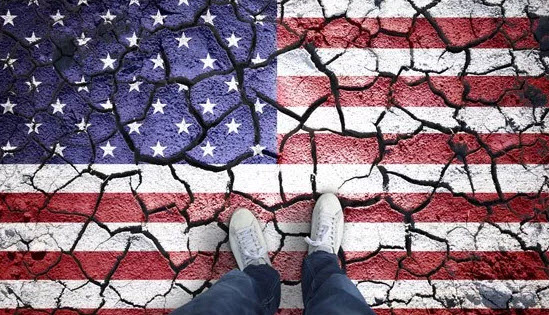After a slew of presidentially incited pipe bombs sent to two former presidents and Trump-targeted Democrats, and the worst act anti-Semitism (also presidentially incited) in the nation’s history with the slaughter of 11 Jews at a synagogue on Saturday, Americans are consumed with the question: What the hell is going on in our country?
But is that the right question? Once again, we’re bombarded with the nationalistic mind-set, with the unquestioned assumption that must view these acts of violence through the lens of ‘my country.’
To my mind, the right question is: What is happening in our world, and within human consciousness?
That may seem too large in scope and scale, but it isn’t, because context is essential, and seeing things in the right context allows adequate response. Continuing to view events in the same frameworks that produced the conflicts and violence increases the darkness and disorder.
So is the collapse of the American Empire an American problem, or a challenge for humanity? Clearly, given the reality of  the global culture and society, which nationalists at home and abroad are desperately trying to deny and revert, the crisis is one of human civilization and consciousness itself.
the global culture and society, which nationalists at home and abroad are desperately trying to deny and revert, the crisis is one of human civilization and consciousness itself.
Besides, given all the proxy wars, regime changes and economic imperialism that were the underbelly of purported US leadership in the international arena over the last 70 years, it’s not at all clear that the “American century” will go down as a net plus in human history.
An unreasonable fear of scale prevents intellectuals from confronting globalization, while an understandable anxiety causes ordinary folks to react to the fact of a global world in which national boundaries are secondary. Extremists step into the vacuum.
As the Washington Post reported, “When Trump called himself a nationalist in Houston last week, the alt-right knew exactly what he meant. One alt-right commenter was elated because nationalism “is inherently connected to race.”
Globalization is not an ideology; it’s a reality. ‘Globalism’ is a straw man. In reality, globalists’ like Bill Clinton and Tony Blair are internationalists and multilateralists.
Just as there was a time in pre-history when tribalism wasn’t evil but a given, so too there was a time in history when nationalism wasn’t evil but a given. Now however, if you see yourself first as an American, Russian, Chinese, or any other thing, you deny your humanity and contribute to the destruction of humanity.
In fact, to call oneself “an American nationalist” in a nation as toxic as America has become is to brand oneself a misanthropist, a hater of humanity.
In prehistoric times, the tribe was the whole of humanity to its members. In the 17th and 18th centuries, the nation became the whole of humanity to its citizens.
Abraham Lincoln was a nationalist in this sense, because he saw America as a microcosm of humanity. He did not see America as the center, the be-all and end-all of humanity, as present-day nationalists like Donald Trump and David Brooks do.
Brooks lies at every level when he says, “Our common American nationalism is threatened by globalists, people whose hearts have been bleached of the particular love of place.”
It is egregiously false to say, as Brooks also does, that “love for nation is an expanding love because it is love for the whole people.” The whole is humanity. To the extent we love humanity we love our countrymen; to the extent we sentimentally love our countrymen before humanity, we divide and destroy humanity.
It’s true, as the philosopher Renan said, that at best “a nation is a soul, a spiritual principle,” but America lost its soul as nation long before Trump. Indeed, the straw that broke the Spirit’s back in America came with the first Gulf war.
When one’s nation dies, one still has humanity—unless you make your nation all of humanity, in which case you inwardly die too. The death of this nation’s soul hasn’t been faced by a sufficient number of people to allow for a rebirth, much less the birth of something new.
‘Diversity’ has become a hollow, dishonest word, a futile attempt to preserve a variety that has already been lost. People are essentially the same at the core to begin with, but people are becoming increasingly homogenized in character and behavior due to globalization and reactive nationalism.
Identification with a particular group, be it national, ethnic or religious, is inherently divisive and destructive, inevitably producing conflict and war. The antidote to resurgent nationalism and rapacious globalization is the direct, emotional perception wholeness of humanity.
To deeply feel the wholeness of humanity in one’s people, and the wholeness of one’s people in humanity is the only way ahead now.
Martin LeFevre

